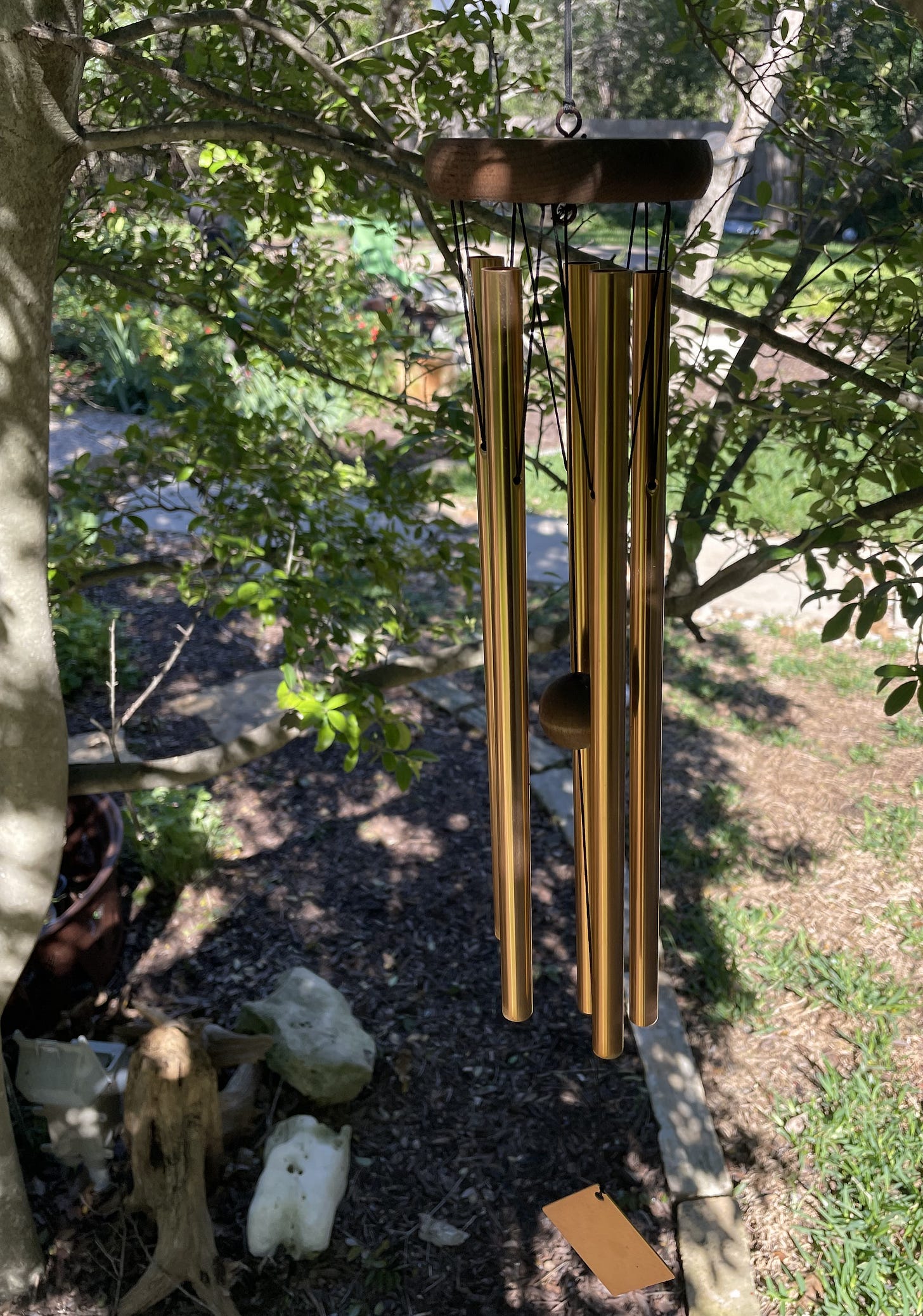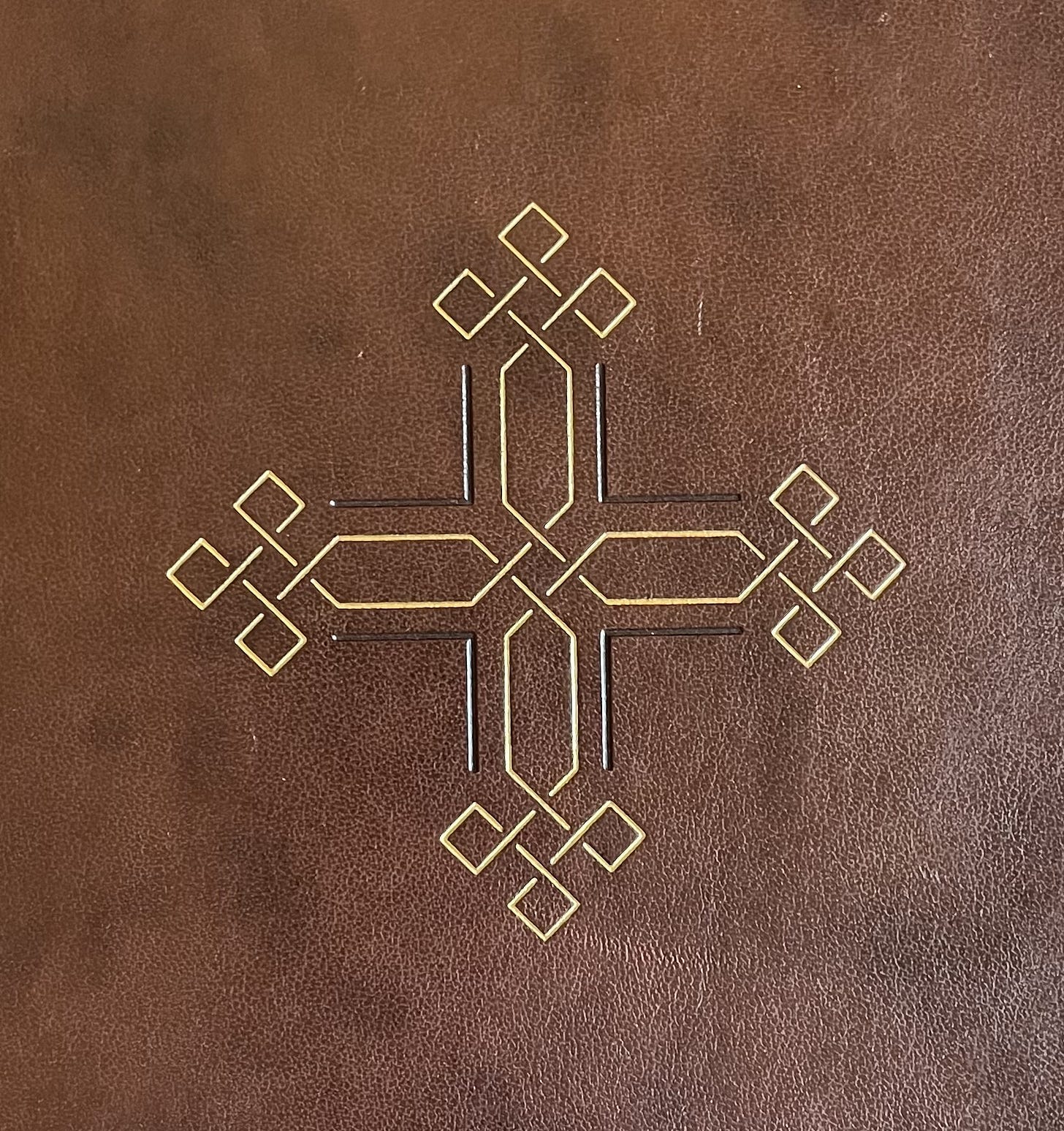This article was previously published in the Journal of Pain and Symptom Management, a palliative medicine journal. I wrote it last year during my training in hospice and palliative medicine. It is with pleasure and with their permission that I share it here now.
What an afternoon to be alive on this earth! A sunny, autumn day-off in Austin, Texas. The temperature has finally dropped out of the nineties, and acorns litter the ground. Hummingbirds inspect any remaining red petals they can find. Oak branches sway gently in the perfect breeze.
The sun warms me just the right amount as I lie on a blanket in the backyard, my belly full from the picnic my children prepared. Not much birdsong this Saturday, but I hear some wind chimes play lightly in the breeze. The chimes were a birthday present back in February. Apparently, they are arranged such that each copper chime plays a note from the song Amazing Grace, though I’ve never been able to discern an organized tune from their chiming. Wouldn’t that be something if the wind rang them out in perfect order?
I sure wouldn’t mind hearing Amazing Grace right now. So many complicated cases in the ICU this week...so many families hoping for miracles that didn’t come... What if the wind chimes played Amazing Grace on a day like this when I really need to hear it? Just imagine it. Imagine feeling the heaviness of all this disease we battle, carrying around the weight of this week’s tragedies, thinking back on such horribly sad situations, and suddenly hearing the notes of that old tune playing out in perfect order. Wouldn’t that be miraculous?
There would, of course, exist several potential interpretations of such an anomalous occurrence. One—that was a miracle, or at the very least, a gift. I heard the song when I most desperately needed to be reminded of something good. Two—no big deal. That’s what the chimes are designed to do. Of course they rang out the song. Three—that was random chance, monkeys on typewriters stumbling upon Hamlet and all that. Don’t go reading into it. Four—maybe the real miracle here is that these chimes exist at all. This interpretation intrigues me the most. Think about it.
This earth, spinning just so through the void of space, had to be at just the right distance from the sun to become habitable. Life had to develop in just such a way that our climate became stable and suitable for the survival of advanced life forms. Man had to progress and develop his civilizations, and a rabbi with a simple message had to come along 2000 years ago and inspire the world. His legacy of grace had to so move a British abolitionist 1700 years later that he began to write this song.
Amazing Grace had to be passed down generation to generation, acapella, on organ, on piano, until some modern craftsman was moved to make wind chimes that capture the familiar tune. Maybe that any human even had the skill and the urge to make these wonder-fully superfluous wind chimes on this small blue planet twirling through space is the real miracle. None of this had to happen, you know.
A fun line of thought, to be sure, but not much consolation to my patients right now. How I have wished for miracles this week! Maybe the brain-death testing will surprise us...maybe she’ll walk again...maybe the cancer will stop progressing or even disappear. We’ve all seen medical outcomes we can’t explain, right? But none of these prayed-for miracles came true.
In my years as an emergency medicine physician, I have done my best to help bring about physical healing, maybe even to facilitate someone’s miracle. My job now, however, as a palliative medicine fellow, is more often to help patients and families when the hoped-for miracles don’t come. It’s a different job, with a different set of skills altogether. I am learning how to listen more carefully and discern from my patients to find out just what sort of miracle they are hoping for. I find myself confessing now to families that I hope for the same thing, even while taking the time to clearly and compassionately explain to them what the science is telling us about their worsening clinical condition. The honesty feels brutal sometimes, but is the kindest communication I can offer.
I am also learning to reframe with a patient or their loved ones how a miracle might look different in a given situation, and even to point out and affirm the “lesser” miracles that a family may have already experienced—It is so wonderful how you are able to be together now...Isn’t it inspiring how she has bravely faced this illness...You have taken such a difficult situation and filled it with love, and that is beautiful...I know it must mean so much to you to know that he is not suffering now…
Though not the cures and healings they hoped for, and though they must be mentioned with tact and grace, recognizing these secondary outcomes as the blessings they are can truly benefit our patients and families. I know I have been blessed time and again during this fellowship when privileged to witness these sacred silver linings.
There exists a different version of supernatural thinking that has thrown me off from time to time in medicine—when our patients and their families interpret an expected therapeutic outcome as a miracle. “It’s a miracle!” a family might exclaim. That’s not a miracle, I often counter in my head. That’s what these antibiotics and pressors and laryngoscopes and chemo agents are designed to do. We do this every day! It’s easy for me, with years of medical school and residency training, to dismiss my patients’ conclusions. But maybe I have been wrong to discount this invocation of the supernatural.
Maybe I need to step back every now and then and reflect on some of the things that I so often take for granted in our medical practices—the tireless march of scientific advancement, the mind-blowing technological breakthroughs, the modern buildings in which we work, the opportunity I’ve had to pursue a calling. These are no small things!
Maybe I need to reflect more on the compassion and dedication of our teams—the nurses, the bedside techs, the respiratory therapists, the physicians, the housekeepers, the cooks, the chaplains—who have dedicated their lives to taking care of patients. I need to consider the medical students, the residents, who are sacrificing their twenties just to learn how to care for the sick. Or the health equity warriors fighting for justice for disenfranchised patient populations. I get to work side-by-side with these passionate people. We get to fight together for the best outcomes for our patients, however that might look. Is there not some amazing grace in being surrounded by such outstanding humans?
Most importantly, I need to always appreciate that our patients actually allow us into their lives. Our patients let down their defenses and give us an opportunity to practice our callings. Another human’s vulnerability is no triviality. I need to marvel often at the privilege of getting to step into the sacred space at the bedside and learn to be more grateful to whomever or whatever led me here.
Whether all this represents the miraculous is up to interpretation, I suppose. But just like the backyard wind chimes, none of this had to happen, you know. Maybe a good and expected therapeutic outcome really does have a touch of the miraculous. I know I have sensed a spark of the divine time after time when a care team compassionately and expertly advocates and intervenes for a struggling patient, regardless of the outcome.
My thoughts drift on as the afternoon shade lengthens. I feel the gravity of our spinning planet hold me against this blanket warmed by our nearest star, even as the notes from my chimes, like our patients’ prayers, seem ethereal enough to escape this terrestrial plain should they so aspire. For me today, that picnic, the smiles on my children’s faces, the gentle breeze, the random ringing of the wind chimes—these are miracle enough.







I can't imagine the challenges taking care of the dying. As care-taker, what is your goal? How do you not try to fix it? Tyler, thank you for what you do!